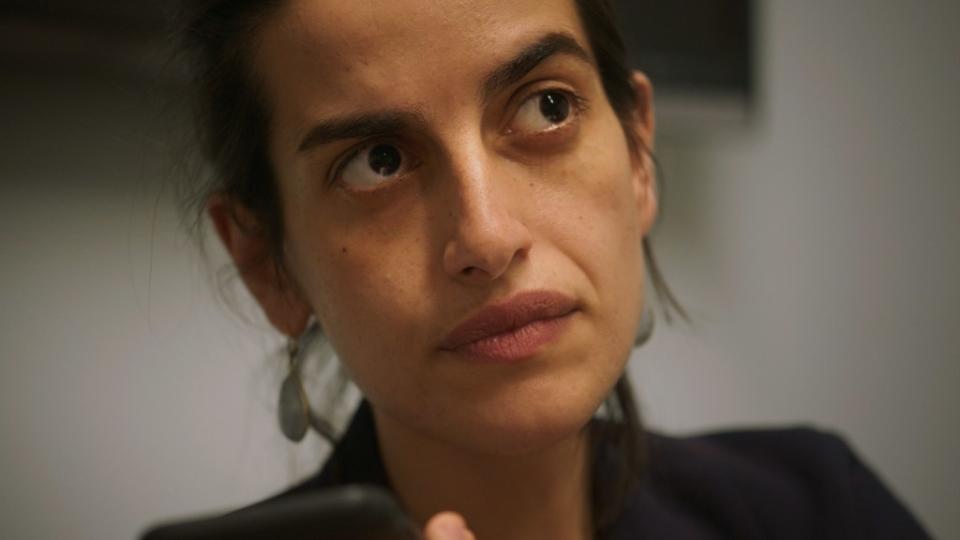Doc Distributors Rail Against Worsening Inequities in the Race for Oscar Gold: ‘If It’s Just a Rich-Kid Popularity Contest, It’s Bad for Everyone’
- Oops!Something went wrong.Please try again later.
- Oops!Something went wrong.Please try again later.

Every year the race for the Oscar for best documentary feature gets more expensive and less inclusive.
The challenging doc marketplace favors a handful of big-name filmmakers commissioned to make one-off films or docuseries. During the last two years, directors of independently made docs, especially those tackling hard-hitting social issues, have been facing an uphill battle to secure distribution.
More from Variety
The major streaming services, who just a few years ago were spending millions to acquire indie fare, seem to no longer be interested in garnering titles out of festivals.
There have, of course, been exceptions. Matthew Heineman’s “American Symphony” sold to Netflix immediately after the film’s Telluride premiere in September, and HBO Documentary Films/Max picked up Joe Brewster and Michèle Stephenson’s Sundance Grand Jury Prize U.S. Documentary winner “Going to Mars: The Nikki Giovanni Project” eight months after it debuted in Park City. Netflix acquired Laura McGann’s “The Deepest Breath” before its Sundance bow in January, while National Geographic scooped up Moses Bwayo and Christopher Sharp’s “Bobi Wine: The People’s President” following its Venice Festival premiere in 2022.
These contenders join a small group of directors who are being supported by various streamers with colossal award season campaign budgets. Those directors include Errol Morris (“The Pigeon Hole,” Apple TV+), Roger Ross Williams (“Stamped From the Beginning,” Netflix), Raoul Peck (“Silver Dollar Road,” Amazon Prime Video), Amanda McBaine and Jesse Moss (“The Mission,” NatGeo/Disney), Dawn Porter (“The Lady Bird Diaries,” ABC Studios/Hulu/Disney) and Davis Guggenheim (“Still: A Michael J. Fox Movie,” Apple TV+).
The streamer behind each of those docs will spend millions on various things including FYC ads, hosting intimate screening events in New York and Los Angeles for doc branch voters, billboards, e-blasts from prestigious nonfiction organizations, top Oscar consultants hired to help elevate a doc’s chances as well as flying filmmakers all over the world to promote their respective work.
It’s a different story for those filmmakers outside that streamer embrace — even when their documentaries have been well received on the festival circuit and they secure theatrical distribution. For most documentarians, distribution looks like it did in the early 2000s, when documentaries were sold territory by territory. For many doc filmmakers, that means selling U.S. theatrical rights to distributors including Magnolia, Kino Lorber and IFC Films. Given the current market, it’s fair to say documentarians with a streamer’s support have a better chance at garnering Oscar attention for their films than docus with only a theatrical distributor — ironic as that may be.
Madeleine Gavin’s “Beyond Utopia” (Roadside), Luke Lorentzen’s “A Still Small Voice” (Abramorama), Mstyslav Chernov’s “20 Days in Mariupol” (Frontline) and Kaouther Ben Hania’s “Four Daughters” (Kino Lorber) are among those backed by smaller distributors trying to break through on smaller promotional budgets this awards season.
Kino Lorber senior VP Wendy Lidell, who acquired U.S. rights to “Four Daughters” after the film premiered at the Cannes Film Festival and won the Golden Eye award there, is blunt about the inequities in the Oscar feature documentary competition, calling it “nuts.”
“I don’t even know why we call them races,” says Lidell. “They are just competitions among those who can spend the most money. It’s just a barrier to entry, especially for documentaries that are about the stories and messages and new filmmakers and voiceless people,” she continues. “It’s problematic.”
To compete against high-rolling competition, Kino Lorber is opening “Four Daughters,” a mix of documentary and fiction about a Tunisian mother whose two older daughters joined ISIS, during award season. That way, its release budget “can also feed into the Academy efforts — because we don’t have a separate Academy budget on top of the release budget,” Lidell explains. “So we dovetail them.”
Director Ben Hania is in the U.S. for a few weeks to promote the theatrical debut of the film, which is also Tunisia’s submission for the international feature Oscar. (In 2021, her narrative film, “The Man Who Sold His Skin,” was nominated for an international feature Oscar.)
“You can have all the money of the Netflixes, Apples and Amazons, but if the voters don’t like the movie, you have nothing,” Ben Hania says. “I have no strategy except [to make] a great film.”

“A Still Small Voice,” which explores the world of hospital chaplains, won the documentary directing award at Sundance. Producer Kellen Quinn, who received an Oscar nomination for his work on Garrett Bradley’s “Time,” considers awards season campaigning as another way to draw potential viewers to Lorentzen’s film.
“We didn’t have to do the awards campaign, but we felt like we have a really special group of people around us,” Quinn says. “We’re acting in a nimble and thoughtful way, and we really want to make the most of it as a tool for meaningful connections to and around the film. That is the driving force for us.”
“20 Days in Mariupol,” the first “Frontline” documentary to premiere at Sundance, qualified for Academy Award consideration through its theatrical run at New York City’s Film Forum. The “Frontline”/AP production centers on a team of Ukrainian journalists trapped in the besieged city of Mariupol and “Frontline” executive producer Raney Aronson-Rath maintains that, despite having a “much smaller” award season budget than the big streamers, “20 Days in Mariupol” nonetheless has a leg up due to the quality of its productions.
“Our budgets are smaller, but what we have found is that people do appreciate us regardless of how big our marketing budget is because the actual work, the actual documentary, is something that you don’t see anywhere else,” Aronson-Rath says. “We just try to make really beautiful, important, and intellectually challenging documentaries with original journalism in them. I have to say that they usually resonate.”
Aronson-Rath adds: “Frankly, if somebody was going to give me $10 million for a marketing budget, I would beg them to let me spend most of it on journalism and some of it on marketing.”
As she did for “For Sama,” which was nominated for an Oscar in 2020, Aronson-Rath will raise funds for “20 Days in Mariupol” if it makes then shortlist and again if the film is nominated.
“I have had a budget that brings us to, hopefully, the shortlist,” she says. “If we are lucky enough to get to that next phase, we will fundraise for that. We definitely have people who would love to support us, but we don’t necessarily have that budget unless that happens.”

“The Eternal Memory,” Maite Alberdi’s follow-up to the Oscar-nominated “The Mole Agent,” won the World Cinema Documentary Grand Jury Prize at Sundance before MTV Documentary Films acquired worldwide rights to the film about love and Alzheimer’s disease. Producer Julie Goldman considers the streamer’s award strategy more sensible than some of its big-spending competitors.
“If you say, ‘This feels like it’s an important thing for us to attend,’ then they always find a way,” Goldman explains. “But it’s not like there’s a fleet of limos outside when you exit an event. They do have resources and that’s exciting compared to situations that we’ve been in before, but it’s not over the top. That feels really in line with what we’re doing with the film.”
For her, big spending on docus “is a little troubling, especially given how few resources there are for production right now, given the contraction in the market, and given all the films that aren’t selling,” Goldman says. “All of those things right now are very worrying for the documentary world.”
“The Smell of Money,” a doc with a title that could apply to many awards campaigns, is leveraging celebrity support through Kate Mara, an executive producer, and got a qualifying theatrical run courtesy the Unreasnble, a new banner backed by Travon Free, Martin Desmond Roe and Mickey Meyer. Mara’s sister Rooney and Joaquin Phoenix recently appeared at a Santa Monica screening of the doc about pig farming as part of its “wink and a prayer” campaign strategy.
“If the movie’s taught us anything, it’s that it’s not about worrying if things are fair or not, it’s about standing up for what you believe in and never giving up,” Free says. “We owe some of the film’s protagonists that same attitude as we approach this campaign.”
Scott Shooman, head of AMC Networks Films Group, a portfolio that encompasses IFC Films, expresses hope that, in spite of disproportionate campaign financing, the best docs will succeed in the end. IFC is releasing Nicole Newnham’s “The Disappearance of Shere Hite,” about the famed sex researcher, and bowed Jesse Short Bull and Laura Tomaselli’s “Lakota Nation vs. United States” earlier this year.
“We are not going to pretend that we are the size of Apple or Amazon as a company,” Shooman says. “I think they have terrific documentaries. We have terrific documentaries, and so we have to trust the Academy, that there are rules in place that ultimately the quality of the movies is going to cut through.”
He adds: “Because if it’s just a rich-kid popularity contest, it’s bad for everyone.”
Best of Variety
Sign up for Variety’s Newsletter. For the latest news, follow us on Facebook, Twitter, and Instagram.

